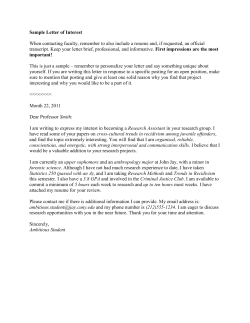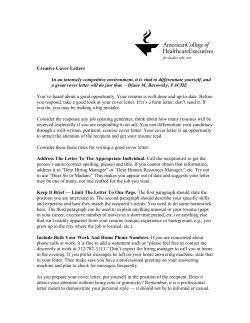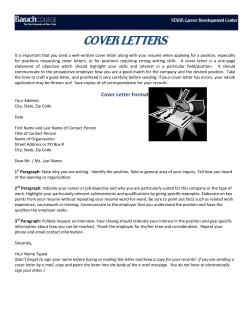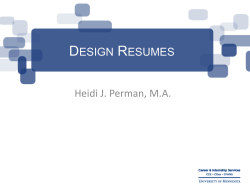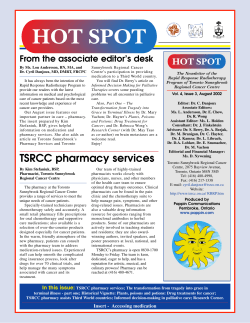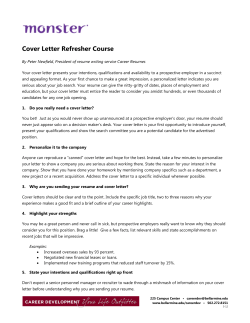
Pharmacy Resumes & CV’s in the field of
Resumes & CV’s in the field of Pharmacy Brought to you by Career Services The University of Toledo Student Union Room 1532 (419) 530-4341 www.student-services.utoledo.edu/career What is a Resume or CV? A resume or curriculum vita (CV) is a document that lists your experience and skills in a clear, concise format. When developing this important professional document, keep in mind that the optimal resume fits on one page, while some individuals may have enough experience and additional relevant information to fill two pages. CV’s are usually 2-3 pages long for recent graduates, and can be lengthier for seasoned professionals. Important Guidelines o o o o o o o o o o o Do not use a Microsoft Word Template to create your resume or CV – Recruiters can spot these templates, and they may perceive your resume as less creative and original than other candidates’ documents. Never use less than an 11 point font. Avoid “fontomania!” Choose fonts that are easy to read like Times/Times Roman, Arial, or Helvetica. To describe experiences that you have completed (i.e. your internship last semester, your rotations) use past tense. For positions that you are still completing, use present tense to describe the projects you are working on and the skills you are developing. Never list a heading (like “Professional Development,” “Computer Skills,” or “Conference Attended”) and type N/A beside it – just leave it off completely. It is not necessary to include “RESUME” or “CURRICULUM VITA” at the top of your document. Consistency is critical. For example, if you want to end your descriptive statements under the jobs you have held with a period you can, or you can choose not to use end punctuation. Either way, make sure you use the same format for every statement. Beware of bold, italics, or underline overload – these highlighting features should guide the reader to important topic headings and pieces of information, not distract the reader from all of the skills and knowledge you have to offer. Always send a cover letter with your document (refer to Career Services’ Resume Writing & Job Search Correspondence publication for assistance with cover letter writing). Update your resume/CV at least once every semester. Always be honest! Information to Include in Your Resume Most resumes will incorporate the following basic headings: Contact Information Objective and/or Summary Education Experience Organizations, Skills, or Activities A focused resume may have headings identifying key skill areas to target a specific field. For example: Management Experience Leadership Experience Research/Writing Experience Teaching/Counseling Technical Skills You may also choose to include other descriptive headings in your resume: Honors Athletic Awards Campus Activities Relevant Coursework Professional Affiliations Contact Information Your full name, address (school and permanent, if you have both), telephone numbers (include area codes) and e–mail address (as long as you check it frequently!) should be included. Remember that your email address should reflect a professional attitude. Avoid anything “cute,” suggestive, or humorous. Objective and Summary Resumes may incorporate a brief objective provided it is clear, concise, and targeted to your employment goal. If you want to explore more than one career option, develop two or three resumes each with a different objective aimed at a specific type of position. When writing a professional objective, include at least two of the following three components: 1. Position desired—pharmacist, toxicologist, pharmaceutical sales representative 2. Organization type—research facility, drug manufacturing firm, retail pharmacy 3. Knowledge, experience, or skills offered—proven communication skills, analytical skills, managerial experience, knowledge of automated prescription systems Phrases such as: “a challenging, entry–level position” or “position dealing with people” are unclear and mean little to a potential employer. Use stronger statements such as “seeking a pharmaceutical sales position where I can utilize my proven sales experience, excellent communication skills, and extensive knowledge of prescription drugs to assist doctors in treating patients effectively.” If you do not wish to include an objective, you can leave it out, or you can incorporate a Skills Summary or Professional Highlights section instead. If you choose to omit the objective, your cover letter will serve as the statement that targets a specific job or industry. Education The Education Section highlights your academic preparation at UT and any other colleges or universities, including study abroad. List your most recent degree first. Include the name and location of each institution. Include your degree, major and minor, date of graduation, and any specialized coursework. Do not abbreviate the name of your degree or major/minor. If you were a self– supporting student, you may want to include the percentage of college expenses you earned through academic scholarships, financial aid, and seasonal/part–time employment. You may include your overall GPA, major GPA, both, or neither. In deciding whether to include your GPA, consider the impression it will have on the reader. Will it make you stand out? A general rule of thumb is to include any GPA that is above a 3.0. Indicate the scale the GPA is based on, for example 3.2/4.0. When applying to academic positions, it is also important to list your thesis topic/dissertation topic and advisor’s name. Experience or Employment Include any activity (paid or unpaid, internship, schoolwork, volunteer) that allowed you the opportunity to acquire and/or implement job-related skills. List your experiences in reverse chronological order, starting with the most recent. If necessary, you may want to break this into two major categories, such as Relevant or Related Experience and Additional Experience. Separating Relevant and Additional experience works well if you have held many jobs, but not all of them are directly related to the field you want to pursue. This format allows you to put the most relevant items together, and place them closer to the beginning of the document. For each position listed, include: Name and location (city, state) of the organization Title/position held Dates you were employed Descriptions of your experience using action words Make sure you stress the level of responsibility, special contributions,skills, and abilities that you demonstrated in each of your jobs. Use past-tense, action verbs in the descriptions of your accomplishments and responsibilities. For example, “Increased sales by 75% within six months” is a more descriptive statement than “Significantly increased sales” or “Responsible for selling merchandise.” Quantify and qualify each experience. If you waited tables, how well did you do it? Did you receive any awards or promotions? Measure how much you did and explain how well you did it. In most cases, include only experiences or work performed during college. An exception to this recommendation would be to list jobs held during high school that are directly related to your career objective. If you are a returning adult student, you may include all relevant experience acquired during the past ten years. Remember, even if you held a volunteer position, the skills you developed may still be critical to your job search. Include unpaid experiences like internships and volunteer responsibilities on your resume. Activities and Leadership Roles Extracurricular involvement highlights your community service experience, leadership roles, sociability, and energy level. List activities that support your professional objective by pointing out your organizational, project management and leadership skills. If you have been involved in many activities, select the ones in which you were most active, and briefly describe your responsibilities. Additional Sections Several other sections may be used on your resume to demonstrate unique qualifications. These sections may include honors, awards, publications, presentations, research projects, or study abroad (which may also be listed in the education section or under a separate heading). Use a skill section to highlight your special qualifications such as language proficiency, computer knowledge, research skills, or grant writing ability. Personal information (other than contact information) is not appropriate, and it is illegal for an employer to solicit personal data such as your age, height, weight, marital status, number of children, national origin, religion, sexual orientation or disability. Military experience can be listed under a separate heading or in chronological order under Experience, depending on your preference. References References should be provided on a separate sheet, included on an application, or listed on your resume simply as “References available upon request.” Generally, a reference list will consist of the name, title, work mailing address, telephone number and email address of three to five academic and work/professional references. Do not use friends and relatives as references. Good choices include faculty members, supervisors, organization advisors and fellow researchers. What is a Curriculum Vita? A curriculum vita, often called a "C.V." or "Vita" for short, is a detailed, lengthy, structured outline of your education, publications, projects, awards and employment history. It is not uncommon for a midcareer candidate’s vita to be as long as twenty pages. Vitae are typically required for positions in academia, including college-level administration or teaching and scientific research. Generally, you should assume that all academic positions at four-year academic institutions require a vita, while other positions require resumes, unless the job announcement specifically requests a vita. Information to Include in Your CV Depending on the discipline in which you are applying for a position, the exact format of your vita may vary. However, the basic information stays the same. We suggest you ask a graduate advisor or other faculty member to review your vita for specific content and format. The following information, however, should be included in every CV: o o o o o o o o o o o o o o o Name, address, phone numbers (identified as home or office), email addresses Objective – A specific position title Education/Academic Preparation – Conferral dates and degree titles of all degrees Licensure/Certification Work Experience – Include teaching, research, clinical rotations, clerkships & graduate assistantships Publications, Presentations, Papers and Patents – include current submissions Performances, Exhibitions, and Compositions Current Research Interests Grants Awarded, Worked on, or Revised Languages and International Travel Professional Memberships Honors and Awards Professional Service and Consultations Relevant Leadership Experience – being president of the high school drama club may not be relevant, but serving as the president of the graduate student association might be Specific Skills –Lab techniques and equipment, computer programs and languages, technology and other technical skills Include a cumulative footer at the bottom of each page of your vita. A cumulative footer lets the reader know which page s/he is reading. Include your first page as page number one. The footer can be a smaller font size to conserve space, and is most appropriately placed in the lower, right-hand corner of the page. Refer to the Example CV later in this document for a suggested format. Information NOT to Include in Your Professional Resume or CV Avoid the following personal information unless you are specifically requested to provide it: o Age o Ethnic identity o Political affiliation o Religious preference o o o o o o o Hobbies Marital status Sexual orientation Place of birth Photographs Height, weight, health Disability If you are ever unclear as to whether you should include a particular piece of information or not, leave it out. The institution or organization can always ask for the information if it is necessary. Resources: http://www.careers.ucr.edu/Students/Graduates/CV/index.html http://psych.hanover.edu/handbook/vita2.html http://www.hsph.harvard.edu/careers/guide-samplecv.html http://recruit.sciencemag.org/feature/advice/cvsource.shl http://www.physicianboard.com/cv.php3 http://www.free-resume-tips.com/resumetips/curriclm.html http://www.unf.edu/dept/cdc/publications/curriculum/welcome.htm#When http://technicaljobsearch.com/resumes/center_7.html http://www.quintcareers.com/curriculum_vitae.html http://www.handsoncv.co.uk/subadvice.asp http://www.ufps.edu/cv.htm http://www.uky.edu/Libraries/ptvita.html http://ucdavis.placementmanual.com/resume/resume-20.html http://www.utexas.edu/research/eureka/resources/vitae/index.php Pharmacy Resume Example 1 Mindy Markwith Present Address: 111 Ross Lane Toledo, OH 43606 419.478.5555 pharmacystudent@email.com Permanent Address: 323 Blue Lake View Fremont, OH 43420 419.334.0000 Career Target: Pharmaceutical Management Technology Education Bachelor of Science, Pharmaceutical Sciences: Pharmacy Administration The University of Toledo, Toledo, OH, Expected date of graduation: May 2005 • Minor: Business Administration/Professional Sales • Academic Highlights: Dean’s List, Success Award, Dearce-Koch Scholarship Related Experience Pharmacy Administration Internship Rite Aid Corporation, Anytown, OH; Summer 2004 • • • Trained in Profit Loss, Management Techniques, and Inventory Control Developed screening questions for part-time positions and created online application process Assisted with implementation of new Inventory Control software Pharmacy Technician Walgreen’s Pharmacy, Nearby, OH; 2001-2002 • • Launched new patient information campaign about antibiotic resistance and a “Customer of the Month” recognition program Filled prescriptions accurately and efficiently Pharmacy Technician Wal-Mart Pharmacy, Springtown, OH; 2000-2001 • Answered phones and assisted customers with product and prescription questions Residential Specialist Additional Experience Sunshine Children’s Home, Maumee, Ohio; 2003-Present • • • Supervise four clients: bathing, feeding, changing, and teaching basic life skills Develop and instruct basic technology courses for 10-12 clients weekly Streamlined weekly client data collection and administrative paperwork submission Campus Assistant Specialist The University of Toledo Police, Toledo, Ohio; 2002-2003 • Tracked daily requests/complaints, tabulated monthly statistics, and published online reports Campus Activities/Leadership Lambda Kappa Sigma, Toledo, OH; 2001-Present • President, 2004-2005 Academy of Student Pharmacists, Toledo, OH; 2002-Present Pharmaceutical Sciences Organization, Toledo, OH; 2003-Present • Treasurer, 2004-2005 Campus Crusade for Christ, Toledo, OH; 2001-Present • Women’s Team, 2002-2003 • Partnership Team, 2003-2004 Real Life, Toledo, OH; 2001-Present • Secretary 2003-2004 Pharmacy CV Example 1 LEAH BROWN 1222 Key Street • Maumee, Ohio 43537 • 419-222-2222 • lbrown25@hotmail.com HIGHLIGHTS High-energy, dependable individual focused on continued professional development Extensive experience in long term, ambulatory, and hospital care Dedicated to improving the health and wellness of others Committed to overcoming daily challenges leading to positive patient outcomes EDUCATION The University of Toledo, Toledo, OH Doctor of Pharmacy Candidate, May 2005 The University of Toledo, Toledo, OH Bachelor of Science in Pharmaceutical Sciencse, May 2003 Cum Laude Ohio Academic Scholarship, Leadership Scholarship, UT Academic Scholarship Dean’s List: Spring 2003, Fall 2002, Fall 1999 LICENSURE Ohio State Board of Pharmacy Intern License, January 2001 – present American Red Cross Association CPR Certification, May 2004 DOCTOR OF PHARMACY CLINICAL CLERKSHIPS Medco Pharmacy, Dublin, OH Managed Care – Marilyn Wollett, PharmD, April 2005 Healthcare Pharmacy, Covington, OH Long Term Care – Chris Harshbarger, PharmD, March 2005 Wright Patterson Air Force Base Pharmacy, Fairborn, OH Internal Medicine – David Streeter, PharmD, February, 2005 Parkview Hospital, Fort Wayne, IN Surgery/Pain Management – Jarrod Brubaker, PharmD, January 2005 St. Charles Hospital, Oregon, OH Emergency Room – Lauryl Kristufek, PharmD, November 2004 Hu Hu Kam Hospital, Phoenix, AZ Ambulatory Care – Michelle Garland, PharmD, October, 2004 Presented “Migraine headaches” disease state discussion to pharmacy staff on two separate occasions Developed a patient leaflet about gatifloxacin Properly trained to give erythropoiten SQ injections to patients with chronic renal insufficiency Counseled patients on medications Answered pharmacist drug information questions including: severity of QTc prolongation between quinolone antibiotics and other drugs, warfarin use in patients with femoro-politeal bypass grafts, erythropoiten administration when ferritin levels are increased L. Brown - 1 Toledo Hospital, Toledo, OH Internal Medicine – Mike Thomas, RPh, September 2004 “Hypertensive Crisis” case presentation to pharmacy staff Rounded daily with doctor and pharmacy resident Provided drug information especially dosing of medications and appropriate therapy suggestions for treatment of various conditions Discussed topics with my pharmacy team including treatment of DVT and atrial fibrillation St. Vincent Mercy Medical Center, Toledo, OH Pediatrics – Kevin Holder, PharmD, August 2004 “Lymphadenopathy and a Dilated Pupil” case presentation to pharmacy staff and students “Dextromethorphan and Diphenhydramine for Children: Does It Work?” journal club presentation to pharmacy staff and separately to pediatric medical team Presented “What is the D-test?” to the pediatric medical team Provided antibiotic tasting for pediatric medical team Actively provided drug information to medical team in a timely manner consisting of pediatric antibiotic dosing, interactions, side effects, and contraindications Researched administration of vaccines: “Why IM versus SQ injections?” PROFESSIONAL EXPERIENCE Pharmacy Intern Heartland Healthcare Services Toledo, OH September 2002 – present Recommend appropriate drug therapy to physicians, monitor therapy per protocol, and initiate appropriate formulary procedures Proficient at compounding prescriptions, preparing intravenous medications, and order entry Communicate effectively with nurses, other pharmacists, and physicians Excel at multitasking Function as drug information consultant Pharmacy Intern The Pharm Pharmacy August 2001 – May 2002, October 2000 – May 2001 Dispensed prescriptions to patients quickly and accurately Efficiently problem-solved patient/insurance company issues Counseled patients on correct use of over–the–counter medications Toledo, OH Pharmacy Intern Mercy Medical Center Springfield, OH May 2002 – August 2002, May 2001 – August 2001 Proficient in technician duties in the areas of Inpatient, Long Term Care, Outpatient Care, and Intravenous Medication preparation Developed new improved heparin protocol for use throughout the hospital Reorganized Emergency Room Chart list of medications for Mercy Memorial Hospital Maintained adequate supplies in assigned area so medications were dispensed in timely and efficient manner, including legend drug products and OTC medications Assisted with inventory review Received “Mercy Care and Compassion” award for exceeding duties to help a coworker ADDITIONAL EXPERIENCE Lab Teaching Assistant The University of Toledo Toledo, OH Fall 2003 – Spring 2004 Formulated patient scenarios with medications for students Trained students on proper counseling techniques and correct medication data Demonstrated correct use of specific medication devices L. Brown - 2 First Year Information Instructor The University of Toledo Toledo, OH Fall, 2001 Improved communication skills Led students in “getting-to-know you” activities Expressed important tips for surviving your first year in the college of pharmacy ASSOCIATIONS Academy of Students of Pharmacy, Fall 1999 Alpha Phi Omega Service Fraternity, 2000 Leadership UT, 1999 – 2003 Alpha Zeta Omega, 2000-2002 Golden Key National Honor Society, 2000 – 2003 COMPUTER SKILLS Word, Excel, PowerPoint, Internet Explorer, CRX pharmacy system REFERENCES Available upon request L. Brown - 3
© Copyright 2025

